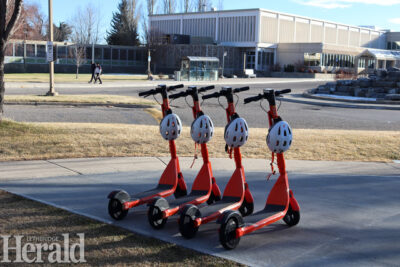SPC to be asked to support e-scooter program
By Al Beeber - Lethbridge Herald on January 30, 2024.
 Herald file photo -
Neuron mobility e-scooters sit parked at Lethbridge College earlier this month before the change in winter weather ended the program for the season.
Herald file photo -
Neuron mobility e-scooters sit parked at Lethbridge College earlier this month before the change in winter weather ended the program for the season.LETHBRIDGE HERALDabeeber@lethbridgeherald.com
The Assets and Infrastructure Standing Policy Committee of Lethbridge city council on Thursday will be asked to recommend continuing permit shared micro-mobility services here.
An update by Transportation engineer Adam St. Amant says a two-year pilot program with Neuron e-bikes and scooters has been well-received and well-used by riders in Lethbridge.
The City awarded a contract to Neuron in January, 2022 after council in May of 2021 recommended that a micro-mobility pilot be undertaken.
The SPC will hear two recommendations from St. Amant.
One is to continue permitting a single shared micro-mobility service provider to operate in Lethbridge, a provider to be selected through a competitive Request for Proposal (RFP) process.
The second recommendation is to permit multiple shared service providers to operate in the city, these which would be selected based on a qualification process outlined in a permit process that hasn’t yet been established.
The single provider recommendation matches the previous approach used in the pilot program and Amant’s report says it is “efficient to administer and simplifies follow-up relating to customer complaints as there is only one service provider.”
The competitive request process lets the City set expectations around shared micro-mobility services and lets potential providers to propose programs that meet or exceed expectations of the City.
The report says that having a shared program gives additional transportation options to residents.
Permitting multiple providers, says the report, allows direct competition and could result in an increased number of mobility units, potentially increasing clutter on sidewalks reducing space for people with mobility impairments.
The report notes that “Lethbridge is a relatively small market for shared micro-mobility services. With increased competition, service provider revenues may decrease and could impact levels of service. Having multiple service providers could result in customer concerns taking longer to address as the correct service provider would need to be identified or multiple service providers would need to be contacted.”
Both recommendations state that improper parking in public spaces can reduce accessibility if blocking clear address and sidewalk riding could cause discomfort to pedestrians because of the size and speed of units.
“Sidewalk riding can also be hazardous to riders when crossing roadways and rear alleys where drivers may not be expecting to encounter units moving faster than walking speed or where sight lines between the riders and motor vehicles are limited,” says the report.
Micro-mobility service reduces greenhouse gas emissions through lowering the number of motor vehicle trips, the report says.
A report by Neuron shows that 63 per cent of trips result in a direct purchase from a city business and that $22 was spent by Neuron riders at businesses per e-scooter trip.
Neuron says there was $6,300 spent at businesses by riders per e-scooter deployed and that a total of $32. million was spent at Lethbridge businesses each year by Neuron riders.
Fifty two per cent of trips replace a car journey, says the company and 99 per cent of users feel the company has created a positive impact here, says Neuron.
Riders spend 29 per cent of their money on general shopping, 25 per cent at restaurants, bars and cafes and 15 per cent at entertainment and recreation venues.
“The increasing popularity of e-scooters offers a helping hand to embattled businesses in downtown areas and main streets by making it easier for residents, visitors and workers alike to get to and from these activity centres,” says the company.
21-20





Neuron threw some numbers out there that should’ve had a disclaimer. How do they know how much people spent at businesses, avoided car trips or the overall feelings about the company? By survey I imagine and who answers all surveys? I certainly don’t as amazon continues to remind me. Call me a cynic but when people throw out numbers as if they incontrovertible fact, I ask questions. Something we should’ve done with the agri food hub.